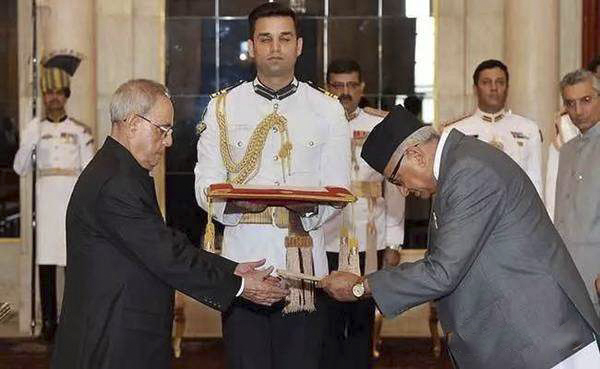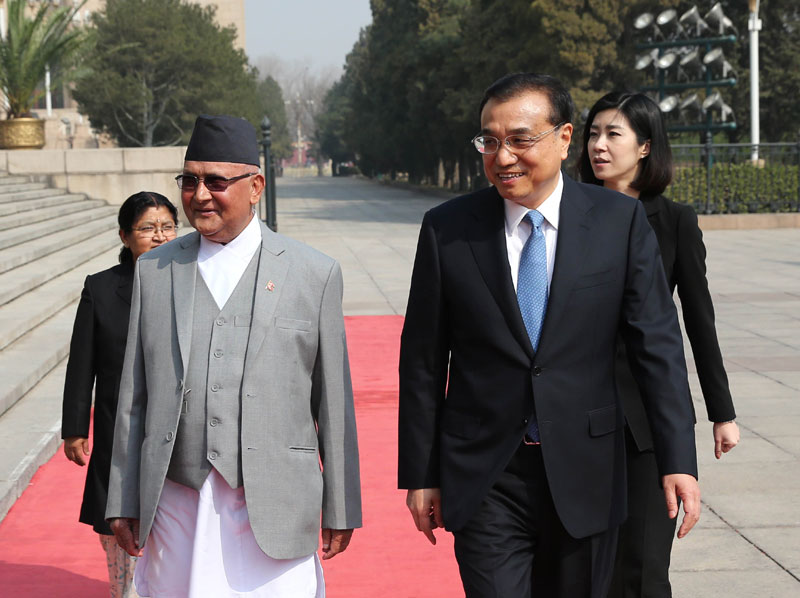Lately a consignment of goods has become a hot topic of discussion in India and China. The consignment in question, worth $2.8 million, was dispatched from China to Nepal on Friday, leading to deliberations about the possible effect it could have on Indian businesses reaching out to Nepal.
Reports of Indian and Chinese competition in Nepal have become common in the recent past. The two have a unique relationship with Nepal and inimitable advantages of their own. As discussions on both sides heat up, it is worthwhile to take a look at the distinctive advantages that make both rising powers irreplaceable partners to Nepal.

2016年11月2日至4日,印度总统慕克吉对尼泊尔进行了正式访问,这是时隔18年印度总统对尼泊尔的首次访问。图为尼泊尔总理普拉昌达(前排右)向穆克吉(前排左)授勋。
Indian President Pranab Mukherjee visited Nepal in early November. He had a productive stay in the neighboring country — meeting not only the president, prime minister, vice-president and leaders of major political parties but also the Madhesi leaders of the Terai region. Prashant Jha, a noted journalist, remained positive about Mukherjee's visit, maintaining that the Indian president achieved two main objectives — reviving bilateral trust and prodding Kathmandu toward constitutional accommodation. The visit goes to show the proximity India and Nepal enjoy.
C. Raja Mohan, the director of Carnegie India, observes that Prime Minister Narendra Modi has termed Nepal India's "Punya Bhoomi" or Holy Land, while India could be called the "Karma Bhoomi" of Nepal, meaning the land where one works. As faith and religion command an important place in the societies of both countries, their common spiritual legacy is vital. He further explains that, with porous borders between the two countries, Nepali citizens are free to move and work in India.
India-Nepal ties are strong at a people-to-people level. A large number of Nepali citizens work in India, including a significant number in the armed forces. India is also an attractive destination for students. Bearing this in mind, President Mukherjee invited Nepal to be a part of "India's growth story." During his recent trip, he announced that Nepali students would be able to study at India's prestigious Indian Institute of Technologies, which would conduct entrance examinations in Kathmandu as well.
China and Nepal also have a close relationship. China has matchless investment potential and expertise in the field of infrastructure development that states in the subcontinent can benefit from. Considering Nepal's need for development in the sectors of railways, roads and energy, China has great advantages.

2016年3月21日,国务院总理李克强举行仪式欢迎时任尼泊尔总理奥利(前排左)访华。
During future meetings of Chinese and Nepali leaders, such topics will definitely be on the agenda. During former Nepalese prime minister KP Oli's visit to China in March, President Xi Jinping mentioned that both nations were developing and could become a "community of common destiny," a thought Xi might like to take forward in the coming years.
Talks of trilateral cooperation between India, China and Nepal have also been brought up, especially by China. While India might take time to warm up to the idea, it is important for the three states to realize that, as far as Nepal is concerned, India and China have their own advantages and are not replaceable. China and India, as two big brothers, should respect Nepal's "balance policy" and support national development - it is unnecessary to force Nepal to take sides.
第一作者:龙兴春,察哈尔学会研究员,西华师范大学副教授、印度研究中心主任
第二作者:Rishika Chauhan,西华师范大学访问学者
(原载于《环球时报》英文版,图片来源于网络)